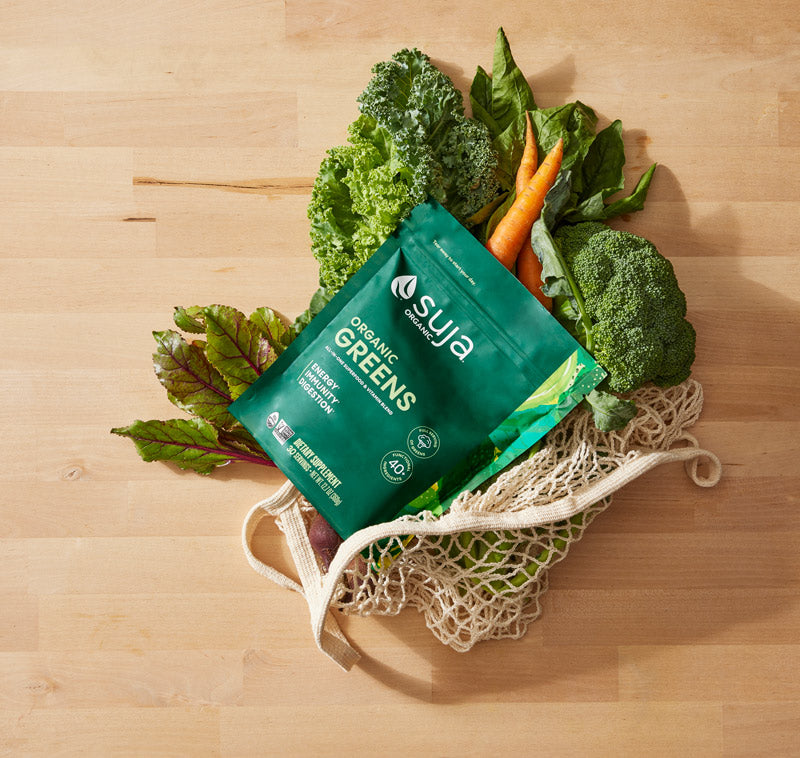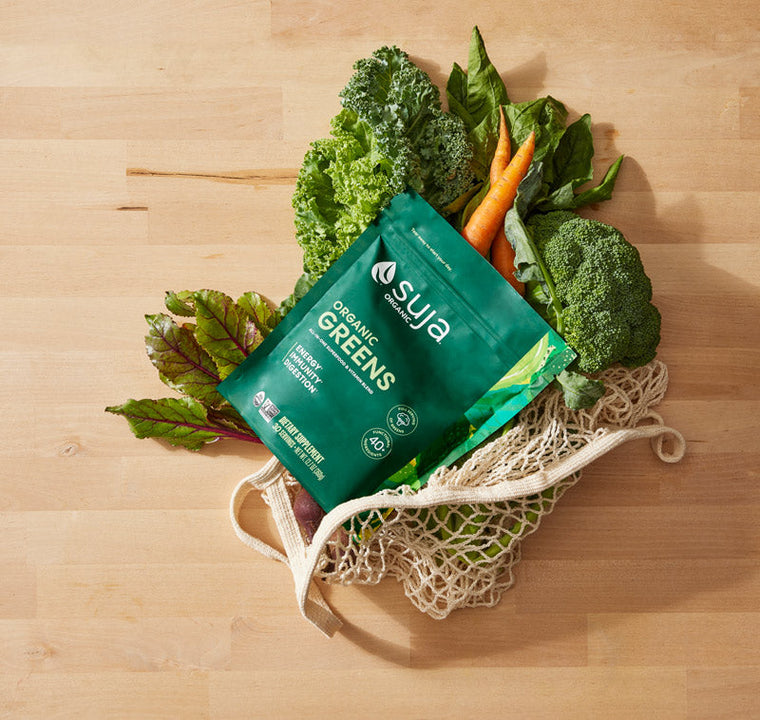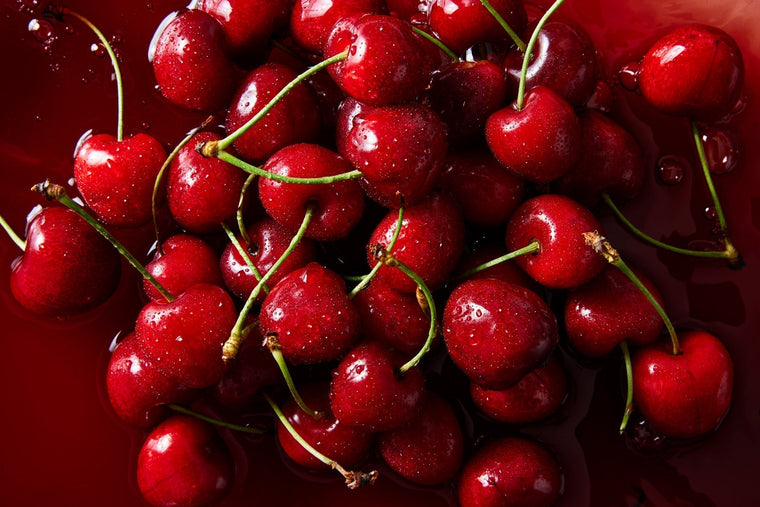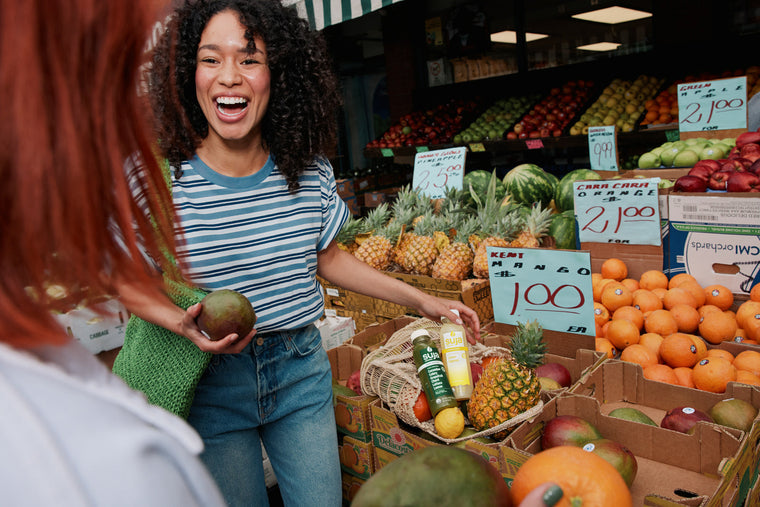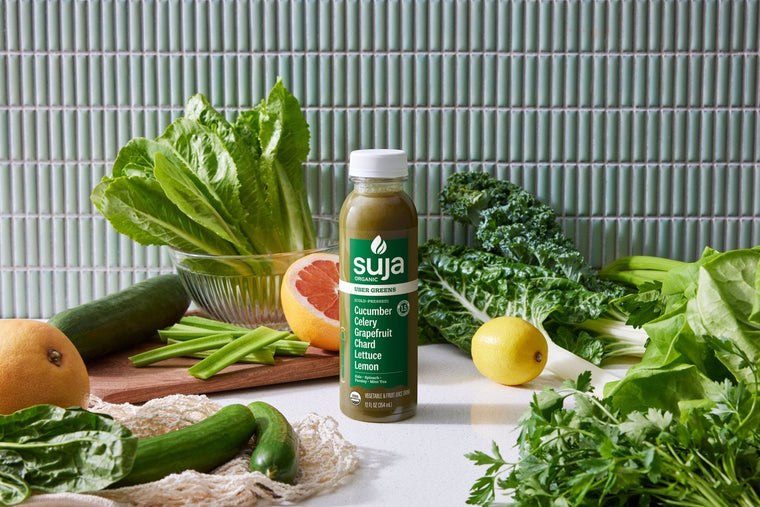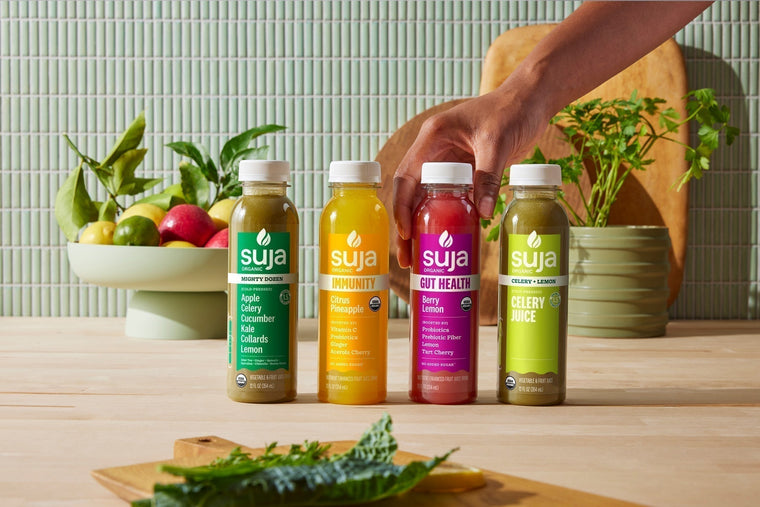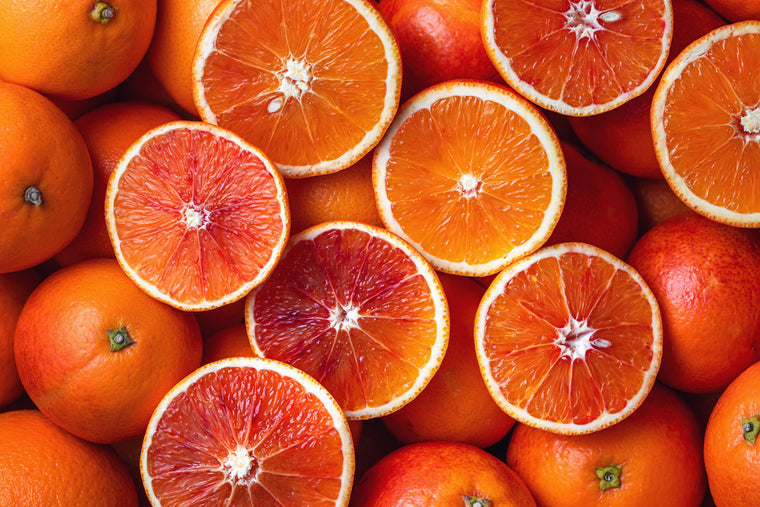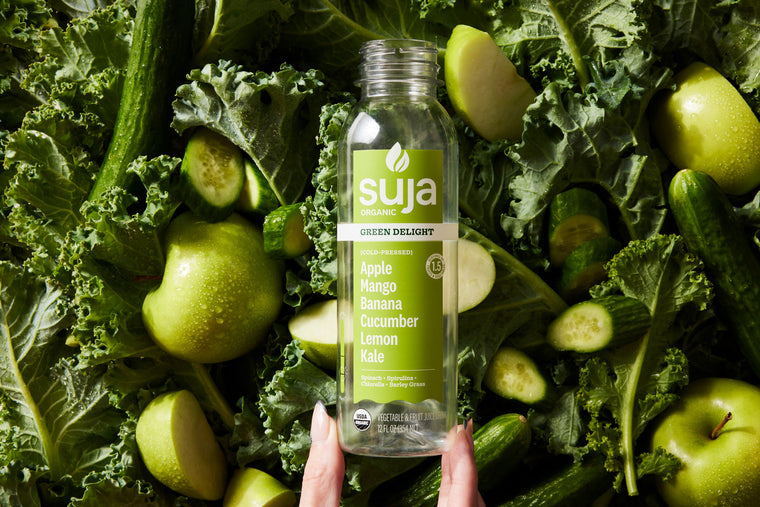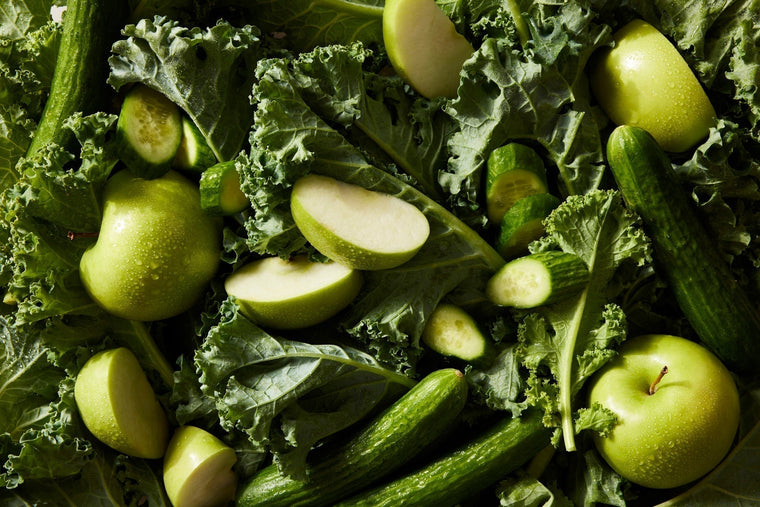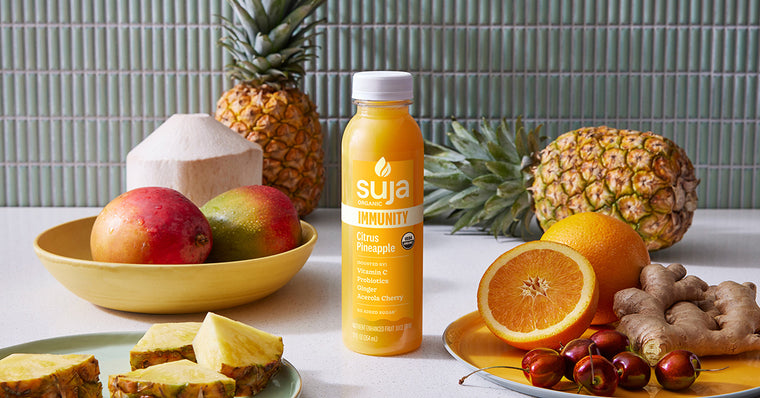Here at Suja Organic, we're uber passionate about the benefits of choosing organic produce whenever possible. Why? Well, besides boasting a farm-fresh taste, organic products are typically grown without synthetic chemicals and certain pesticides, which many consumers find appealing and potentially better for the environment. 1
With this in mind, The Dirty Dozen list highlights twelve types of produce that, according to the EWG, tend to have higher pesticide residues. The purpose of this list? To help conscious consumers choose organic, especially when it comes to these items.2 So, let's dive into the lineup that made the cut for 2025.
The 2025 Dirty Dozen List™
Before we delve in, it's important to note that the United States Environmental Protection Agency regulates the use of pesticides, ensuring it abides by the Food Quality Protection Act (FQPA).3 Even though there are safety measures in place for consumers, we believe it's still important to make informed decisions when it comes to buying produce and going organic, when possible.
PS: If you want to explore items with the lowest amount of pesticides, EWG also releases the Clean Fifteen, according to USDA data. Check it out below! 4

1. Spinach
We love a good leafy green like spinach — it's low calorie, great for the gut, and packed with a plethora of vitamins, like A and C.5 However, spinach tops the 2025 list with more pesticide residue by weight than any other produce tested. Findings from The Cornucopia Institute suggest an increase in pesticide residues on spinach, highlighting the importance of careful washing and consideration of organic options.6 Choosing organic spinach and washing as thoroughly as possible is the best way to reduce pesticide exposure.
2. Strawberries
According to the EWG, the average American eats about eight pounds of strawberries on an annual basis, which isn't a huge shocker. Strawberries make the perfect, juicy snack on a sunny day. So what makes strawberries one of the worst offenders? It's reported that some strawberry growers use various methods, including gases, to manage pests and weeds.7 Because of this fact alone, it's best to buy organic strawberries if accessible to you!
3. Kale, Collard, and Mustard Greens
Just like spinach, kale, collard, and mustard greens are staples in most of our wellness routines, and for good reason. Dark leafy greens typically contain a high amount of phytonutrients that may support immunity and digestion8. Reports indicate a significant presence of various pesticides on these greens, leading to recommendations for choosing organic when possible.9 Next time you're at the grocery store, aim to choose organic, if it is in your budget, when picking up these items!
4. Grapes
Did you know that grapes are one of the most widely grown fruits in the world, with 50% used in wine production? Studies indicate that conventional grapes often show detectable levels of pesticide residues.10
5. Peaches
A warm peach cobbler is practically irresistible, especially if those peaches are from Georgia! According to EWG reporting, 59 different pesticides were found in peaches, and a single peach could contain up to 19 various strains, mainly fungicides.11
6. Cherries
Based on EWG reporting, over 90% of cherry samples contained two or more pesticides. Although cherries are irresistible in the summer months and accessible in most grocery stores, choose organic if it's available to you!12
7. Nectarines
During spring and summer, biting into a plump nectarine might just hit differently. But we recommend choosing organic if possible. According to EWG, some nectarine growers use specific pesticides to prevent browning on the skin during storage.13
8. Pears
Similar to peaches, pears are perfectly soft and sweet! Concerns about pesticide use on pears persist, particularly because their thin skin may absorb residues more readily. Based on EWG findings, six out of 10 conventional pears contained five or more pesticides.14
9. Apples
EWG reported that apples are sprayed with a pesticide that can prevent storage scald, which is browning on the skin. In Europe, there's a restriction on this chemical; however, it isn't as regulated in the U.S.15
10. Blackberries
New to the 2025 Dirty Dozen list, blackberries join the lineup after the USDA tested the fruit for the first time in 2023. Blackberries showed contamination with up to 48 different pesticides, making them an important addition to consider when choosing organic options.16
11. Blueberries
According to the U.S. Department of Agriculture, Americans today are consuming three times the amount of blueberries since the mid-2000s.17 This is great news since blueberries are extremely nutrient-dense, high in fiber, and a slew of vitamins.18 However, recent tests have revealed that pesticides were found in 90% of blueberry samples. So, when you can, opt for organic blueberries!
12. Potatoes
Another new addition to the 2025 Dirty Dozen list, potatoes frequently test positive for chlorpropham, a sprout-inhibiting chemical that has been banned in the European Union. This addition to the list emphasizes the importance of choosing organic potatoes when possible to reduce exposure to these chemicals.19
Curious about what types of pesticides are most commonly detected?
Four of the five that appear most frequently on the list are fungicides: pyraclostrobin, fludioxonil, pyrimethanil, and boscalid.20 Typically, these are used to keep mold at bay, post-harvest.
Don't Do 'Dirty' Wellness
Reading labels and buying organic can be tedious while in the store, but it's evident that choosing organic is important to potentially mitigate exposure to pesticides, as seen in The Dirty Dozen List™.
At Suja Organic, we make clean, organic wellness easy, accessible, and affordable. We're extra picky about the produce we use, and you'll never get a product that's not certified organic! If you're itching to incorporate more greens in your diet that you can actually trust, try our Suja Organic Greens powder to get a full serving of vegetables, vitamins, and minerals your body craves. And if you always want automatic wellness available at your fingertips, choose to have it delivered to your doorstep. We'll do all of the heavy lifting for you. Happy sipping!
What Changed from 2024 to 2025?
For easy reference, here's the 2024 Dirty Dozen list so you can see what changed year-over-year:
2024 Dirty Dozen List:
- Strawberries
- Spinach
- Kale, Collard, and Mustard Greens
- Grapes
- Peaches
- Pears
- Nectarines
- Apples
- Bell and Hot Peppers
- Cherries
- Blueberries
- Green Beans
Key Changes in 2025:
- Spinach moved to #1 (was #2 in 2024)
- Strawberries moved to #2 (was #1 in 2024)
- Blackberries - NEW addition to the list at #10
- Potatoes - NEW addition to the list at #12
- Bell and Hot Peppers - removed from the list
- Green Beans - removed from the list
*Disclaimer: This blog contains promotional content about our products. The information provided in this blog is for educational and informational purposes only and should not be construed as medical advice. While the nutritional information and health tips shared here are based on published studies and expert insights, they should not replace advice and treatment from a healthcare professional. Always consult a qualified healthcare provider with any questions you may have regarding a medical condition or health objectives.
Endnotes
- Better Health Channel. (2021). Organic food. https://www.betterhealth.vic.gov.au/health/healthyliving/organic-food
- Environmental Working Group. (2019). Dirty Dozen™ Fruits and Vegetables with the Most Pesticides. https://www.ewg.org/foodnews/dirty-dozen.php
- US EPA. (2018, March 7). Food and Pesticides | US EPA. https://www.epa.gov/food/food-and-pesticides
- Environmental Working Group. (2019). Clean Fifteen™ Conventional Produce with the Least Pesticides. https://www.ewg.org/foodnews/clean-fifteen.php
- Cleveland Clinic. 7 Reasons You Should Eat More Spinach. https://health.clevelandclinic.org/benefits-of-spinach
- The Cornucopia Institute. (2017, November 13). Eat Your Organic Spinach (But Avoid Conventional). https://www.cornucopia.org/2017/11/eat-organic-spinach-avoid-conventional/
- Environmental Working Group. (2019). Pesticides + Poison Gases = Cheap, Year-Round Strawberries. https://www.ewg.org/foodnews/strawberries.php
- Netmeds. Collard Greens: 5 Incredible Health Benefits Of This Green Leafy Vegetable. https://www.netmeds.com/health-library/post/collard-greens-5-incredible-health-benefits-of-this-green-leafy-vegetable
- Rapaport, L. (2024, March 26). Spinach and Berries Make The "Dirty Dozen" List of Produce With Most Pesticides. https://www.everydayhealth.com/diet-nutrition-pictures/dirty-dozen-fruits-and-vegetables.aspx
- Schusterova, D., Hajslova, J., Kocourek, V., & Pulkrabova, J. (2021). Pesticide Residues and Their Metabolites in Grapes. https://doi.org/10.3390/foods10020307
- EWG. (n.d.). EWG's 2024 Shopper's Guide to Pesticides in Produce™. https://www.ewg.org/foodnews/peaches.php
- EWG. (2019). EWG’s 2019 Shopper’s Guide to Pesticides in Produce™. https://www.ewg.org/foodnews/summary.php
- EWG. (2019). EWG’s 2019 Shopper’s Guide to Pesticides in Produce™. https://www.ewg.org/foodnews/summary.php
- EWG. Pears, With an Extra Helping of Pesticides, Remain on the Dirty Dozen™. https://www.ewg.org/foodnews/pears.php
- EWG. (2019, March 20). U.S. Apples Doused with EU-Banned Pesticides After Harvest. https://www.ewg.org/foodnews/apples.php
- EWG. (2019). EWG’s 2019 Shopper’s Guide to Pesticides in Produce™. https://www.ewg.org/foodnews/summary.php
- ERS. Imports from Latin America make up a growing share of U.S. blueberry consumption. https://www.ers.usda.gov/data-products/chart-gallery/gallery/chart-detail/?chartId=93270
- Leech, J. (2018, October 9). 10 Proven Health Benefits of Blueberries. https://www.healthline.com/nutrition/10-proven-benefits-of-blueberries
- EWG. (2019). EWG’s 2019 Shopper’s Guide to Pesticides in Produce™. https://www.ewg.org/foodnews/summary.php
- EWG. (2019). EWG’s 2019 Shopper’s Guide to Pesticides in Produce™. https://www.ewg.org/foodnews/summary.php

